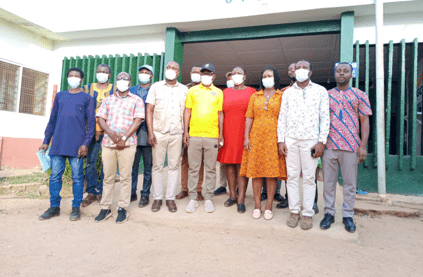By Rafiq Nungor ADAM
Cerebrospinal Meningitis (CSM) has claimed 10 lives in the Upper West Region, with 42 suspected cases reported, according to Dr. Damian Ponguyire – the Upper West Regional Director of Health Services.
“From December through March and April, meningitis is a perennial problem and we report cases every year. However, what is strange this year is that we haven’t gone far into the season, yet the region has already recorded higher than our usual cases; and also the death associated with the cases is also quite high. As of 31st of January, the region has reported 42 suspected cases of meningitis and 10 deaths,” Dr. Ponguyire stated.
Dr. Damian noted that public education is currently ongoing, as many of the deaths were due to late reporting to health facilities.
“Health communication is currently ongoing as we are reporting higher numbers of cases. Our education is centred on early reporting. We have realised that the cases that resulted in death were reported very late, making it difficult for the health staff to manage them. So, we are emphasising early reporting and educating the public on symptoms that suggest someone may have meningitis.”
While Sustainable Development Goal (SDG) 1 talks about no poverty, many of the deaths were linked to financial barriers to healthcare. Dr. Damian Ponguyire further identified cost as a barrier to early healthcare access. “We have also identified cost as a major barrier to accessing healthcare services. Almost all the cases that ended up in death did not have health insurance. From their medical history, it appears they stayed at home for quite some time because they did not have money to visit to the health facilities.”
Due to the rising number of deaths in the region, the Ghana Health Services has sent a six-member delegation from its headquarters as a national rapid response team, led by Dr. Lawrence Ofori Boadu, to assess the situation.
The team visited two epicentres of the disease, namely the Nandom Municipality and the Nadowli Kaleo District.
The team’s first stop was at the Ahmadiyya Muslim Hospital in Kaleo, where they engaged with staff to gather insights. Upon arrival, they spoke with Barikatu Bashiru, a student from the Kaleo Secondary Technical School, who reported symptoms and sought medical attention.
Furthermore, SDG 4 talks about quality education; hence public health education on CSM symptoms and early reporting is being promoted. “On January 19, I fainted in school and was brought to the hospital. One of the nurses was educating us about meningitis and its symptoms. Today in the morning, my neck was stiff and I could not turn it. I then rushed to the hospital. I can move my neck now though I still feel pains a little,” Barikatu recounted.
Again, Sustainable Development Goal (SDG) 3 talks about good health and well-being. In a bid to combat the CSM in the Upper West Region, the Ghana Health Service has announced that the treatment for the disease and related cases will be provided free of charge.
Dr. Lawrence Ofori Boadu, Director of Clinical Care at the Ghana Health Service, noted that their team was deployed under the directive of the Director-General to assess the situation and assist the regional team.
“It is very clear that people face barriers to accessing healthcare, and the first barrier is financial. After analysing the situation as a technical team, we communicated with the Director-General, who fully supports us. We have decided that anyone suspected of having meningitis within this reported region should not face any financial barriers to treatment. Care will be provided free of charge.”
According to the World Health Organisation (WHO), CSM is a serious infection that causes inflammation of the membranes that covers the brain and spinal cord.
Some of the symptoms of CSM include high fever, headache, vomiting, stiff neck, rash, sensitivity to light, sleepiness and confusion.
Both Dr. Damien Punguyire and Dr. Lawrence Ofori Boadu advised the general public to seek medical attention early at the nearest health facility if they exhibit any symptoms. Early detection will enable healthcare professionals to effectively manage the disease and provide timely treatment, preventing complication.













